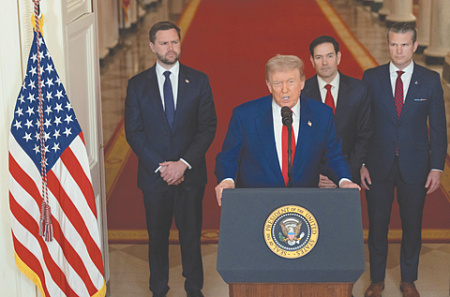
In a dramatic reversal of his campaign promises, President Donald Trump has ordered significant airstrikes against Iran, a move that has ignited a firestorm of international condemnation and sparked immediate calls for his impeachment at home. The operation, codenamed “Midnight Hammer,” was executed without congressional approval, marking a profound shift in White House policy and potentially signaling an end to the administration’s peacemaking efforts in other global conflicts, including the war in Ukraine.
While the White House and Pentagon have publicly hailed the operation as a “stunning success,” internal accounts suggest a more complex reality. Pentagon Chief Pete Hegseth boldly declared that Iran’s nuclear program was destroyed after strikes on key facilities in Fordow, Natanz, and Isfahan. However, Chairman of the Joint Chiefs of Staff Dan Kane, while confirming the use of B-2 stealth bombers and Tomahawk cruise missiles, offered a more cautious assessment, stating that the full extent of the damage is still being evaluated. This discrepancy points to a potential lack of consensus within the top echelons of the U.S. military command.
Fissures are also apparent within the administration, despite attempts to project a united front. The White House released photographs of Trump in the Situation Room flanked by Vice President JD Vance and Secretary of State Marco Rubio, seemingly to counter reports of their opposition to military intervention. The only high-profile dissent came from Director of National Intelligence Tulsi Gabbard, who publicly doubted the immediacy of the Iranian nuclear threat and was promptly dismissed by the President, who stated her opinion was of no interest to him.
The unilateral action has provoked severe backlash in Washington. Prominent Republicans like Congresswoman Marjorie Taylor-Greene have openly criticized the intervention in “not our war,” while leading Democrats, including Congresswoman Alexandria Ocasio-Cortez, have called for impeachment proceedings against the President. While such a move faces an uphill battle in a Republican-controlled Congress, the strikes have undeniably exposed deep divisions within Trump’s own party over his foreign policy direction.
Internationally, the response has been overwhelmingly negative. European allies, led by European Council President António Costa, have urged for a return to diplomacy as the only path to peace. Russia condemned the “confrontational actions” and called for de-escalation. The only steadfast support came from Israel, with Prime Minister Benjamin Netanyahu congratulating Trump on his “bold decision.” In an apparent bid to calm global anxieties, the administration has sent mixed signals, with Vice President Vance ruling out a ground invasion and Secretary Rubio extending an offer to negotiate with Tehran, which has vowed retaliation.
Analysts suggest President Trump has now “crossed the Rubicon,” transforming his image from a leader of threats to one of action. This pivot raises critical questions about the future of his presidency. The move could either entangle the United States in another protracted Middle East conflict, reminiscent of Iraq and Afghanistan, or galvanize a domestic opposition now convinced of the need to remove a leader they see as dangerously unpredictable on the world stage.
